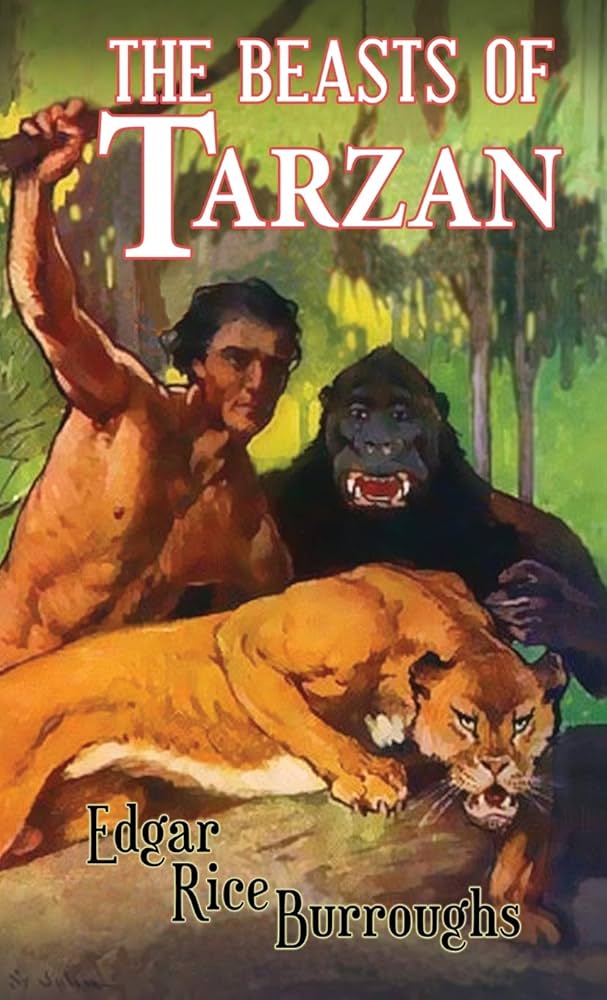Chapter 12 — The beasts of Tarzan
byChapter 12 – The Beasts of Tarzan begins with Jane Clayton regaining her senses in a harsh and unfamiliar place. She awakens not in safety, but in the custody of the Swedish sailor Anderssen, a man torn between his past loyalties and present conscience. A small child lies near her—frail, quiet, and innocent. Jane, disoriented and overwhelmed, believes for a fleeting moment that the child might be her own. Her heart clings to this hope, even when doubt starts to creep in. The child is not Jack, but her maternal instinct doesn’t let her turn away. Love fills the gap left by uncertainty, and she resolves to care for the infant with the same devotion she would show her own.
The jungle around them offers no comfort. With every rustling leaf or distant howl, danger announces itself. Anderssen, once complicit in Rokoff’s schemes, now moves with a quiet determination to keep Jane and the child safe. His change is born not just of guilt, but of a newfound clarity about what matters. The jungle demands more than survival; it tests one’s soul. Through the thick vegetation and oppressive humidity, they push forward. Jane, though physically drained, draws energy from the child in her arms. The human need to protect another breathes strength into her when her own reserves feel near empty.
But the harsh journey soon takes its toll. The child’s body grows weak, its breaths short and shallow. Jane knows something is wrong. There is no doctor in this wilderness, only the slim hope that a native village might provide help. When they arrive at one, it is not kindness that greets them, but wary eyes and cautious whispers. Still, the villagers gather to help. They bring herbs, water, and effort, trying to soothe a life that hangs in the balance. For one moment, humanity transcends borders. People who speak different tongues unite in a common mission—to save a child.
Despite their attempts, the child passes quietly in Jane’s arms. No scream escapes her lips. Grief sits like a stone in her chest, heavy and unmoving. Her tears are silent but constant. Anderssen stands nearby, offering no words because none would suffice. Jane cradles the lifeless body, not out of denial, but out of respect. The bond had been real, forged through fear, love, and sacrifice. Even though the child was not hers, she mourns him as deeply as if he were. The jungle bears witness to a sorrow too vast for its wild sounds to drown.
As she prepares to leave the village, Jane learns of another cruel twist. M’ganwazam, the tribal chief, tells her that Tarzan has been killed. The words strike like a blade. Her thoughts spiral—has all of this been for nothing? Her child lost, her husband gone, and herself trapped in the claws of deceit. The chief’s expression does not carry sympathy. Instead, it feels cold, almost rehearsed. Deep inside, Jane senses manipulation. Something in her refuses to believe Tarzan is dead. That doubt becomes her anchor. She decides then that survival alone is not enough—she must uncover the truth.
Even in grief, Jane Clayton does not yield. Her will hardens. The path forward is veiled in shadows, but she steps into it with resolve. The jungle is not just a backdrop to her suffering; it is now a battleground for her endurance and cunning. Every memory of Tarzan strengthens her resolve, reminding her of the man who would stop at nothing to find her. If he lives, he is searching. If he is gone, his legacy must be honored through her strength. Either way, she cannot give up.
This chapter reshapes Jane not just as a victim, but as a heroine molded by loss. Her grief does not weaken her—it refines her purpose. Readers see not just a woman in peril, but a spirit tested by cruelty, yet not broken. Anderssen, too, is transformed from villain to ally, a reminder that redemption is possible, even in the darkest places. Together, they symbolize hope born from despair. Their bond may be unspoken, but it is forged in mutual survival and shared purpose. As the narrative moves forward, the jungle awaits—with more trials, yes, but also the promise of justice, redemption, and perhaps, reunion.

